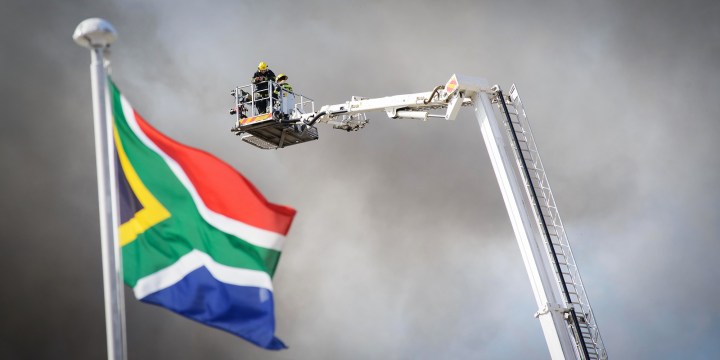POLITICS AND GOVERNMENT 2023
Another uphill year brewing for a South African Parliament that dropped the ball

MPs must improve their performance after a year in which they dropped the legislative ball while politicians went toe to toe.
If mixed metaphors annoy, well, 2022 was just that kind of a year. And the trouble with 2023 will be that much attention, focus and effort will be away from the parliamentary benches as the 2024 electioneering campaigns are set to kick off across political circles.
The first signals of that could come as early as 9 February when the presidential State of the Nation Address opens South Africa’s political calendar – for the second year from somewhere other than Parliament.
The fire-devastated National Assembly building and other sections remain unrepaired and crumbling since the 2 January 2022 blaze – and unloved if the weeds between the cobblestone and rubbish blown into raggedy greenery is anything to go by.
Sometime early in 2023 repair work will go on tender after Finance Minister Enoch Godongwana was persuaded to loosen the purse strings for the roughly R2-billion it will cost. The DA is headed to court if Parliament doesn’t secure alternative venues to resume proper physical meetings.
Covid-19 lockdown restrictions ended yonks ago. And yes, a dozen or so committee rooms are scattered in unaffected buildings on the precinct; traditionally, outside venues have also been hired.
Most recently, Parliament’s spending watchdog, the Standing Committee on Public Accounts, has resumed fully physical sittings. The Section 194 inquiry into the removal from office of suspended Public Protector Busisiwe Mkhwebane has also sat in person, with online links provided.
That impeachment inquiry has delivered acerbic exchanges, gobsmacking whistle-blower testimony and tedious politicking. But it suspended itself before schedule because of witnesses’ unavailability in a programme that has run well past its targeted September 2022 finalisation date. It will resume in early 2023, running down the clock on her non-renewable seven-year term that ends in October 2023.
The other impeachment inquiry – against President Cyril Ramaphosa over his Phala Phala farm forex saga – did not move beyond possibility as ANC MPs used their numbers to nix it. Five rebels, including Cooperative Governance Minister Nkosazana Dlamini Zuma, broke ranks publicly and several more, such as Tourism Minister Lindiwe Sisulu and ex-health minister Zweli Mkhize, were simply absent.
Their disciplinary fate for bucking the party line will lie with the ANC post-elective conference some time in 2023.
Though opposition parties sharply criticised the governing ANC for yet again putting party before state, that vote cleared one cloud over Ramaphosa with three days to go before the party’s elective conference.
Set on resigning, he was persuaded otherwise by Cabinet ministers Gwede Mantashe, who is also ANC national chairperson, Mondli Gungubele, Godongwana, Pravin Gordhan and Eastern Cape Premier Oscar Mabuyane, as well as some others.
Old-school ANC tactics of drawing into the laager and stalling paid off even in the ANC National Executive Committee (NEC) and ultimately meant the NEC told its deployees to Parliament to vote against the Section 89 independent panel recommendation and make it go away.
It was that party marching order über alles approach that the Zondo Commission identified as a contributor to Parliament’s lack of speedy and decisive action on the emergence of claims of State Capture and the twisting of public institutions such as Eskom and Transnet for the private benefit of a few, such as the Gupta brothers, their business associates and selected, politically connected members of South Africa’s political elite.
“If it [Parliament] wants to be taken seriously by the executive and to be treated with respect, it must make it clear to the executive who calls the shots in Parliament,” said the report’s section on Parliament, recommending opposition MPs as committee chairpersons, a presidential oversight committee and more.
Visit Daily Maverick’s home page for more news, analysis and investigations
Now the entire six-volume report is before Parliament’s rules committee, which must decide what to do. That has included issuing a report that opposition parties had to show gaps in how other parliamentary committees do oversight on matters falling under the Presidency before establishing a separate one for the head of state.
But that’s for 2023. Like the Electoral Amendment Bill for which the Constitutional Court had to give not one extension but two, until 31 January 2023.
This really wasn’t in the interest of justice, according to the court the first time round when it found “more should have been done” by Parliament to ensure meeting the June 2022 deadline to amend the law so that independents could also contest in provincial and national elections.
“The minister did not, in fact, take all reasonable measures to give effect to the order. Parliament awaited the minister’s introduction of the Bill,” the court said in granting the first extension. “When it was so long delayed, Parliament should have taken steps to introduce a bill, without reliance on the minister. This it failed to do.”
This electoral amendment law is steeped in politics. The pundits tout the possibility of the ANC’s plummeting below 50% in the 2024 poll, but there is also a broad civil society push for greater accountability by introducing directly elected constituency MPs.
Well, the proposed answer of the National Council of Province (NCOP) to civil society’s call for broader electoral reform – a panel to look into matters – had to go back to the National Assembly, which, unusually, decided that MPs needed to hold further public hearings. And that meant Parliament had run out of time. Again.
Although the NCOP acted on this electoral amendment legislation and all necessary Budget-related laws, the Expropriation Bill’s passage stalled and must resume in this second House in 2023.
Not out of time was the national legislature on the two laws the government wanted passed by the end of 2022 to prevent greylisting by the global anti-money-laundering and anti-terrorist-financing body, the Financial Action Task Force (FATF).
It was a rush, and some MPs grumbled about the pressure ministers put them under after sitting on their draft laws for months and months.
Taking three and five months, respectively, the General Laws (Anti-Money Laundering and Combating of Terrorism Financing) Amendment Bill and the Protection of Constitutional Democracy against Terrorist and Related Activities Amendment Bill were done and dusted.
Though civil society intervention ensured a stop to the mandatory registration of non-governmental organisations to be more in line with the more nuanced, risk-based FATF recommendations, concerns remain, particularly about the anti-terror law. Fudgy remains government action on central issues the FATF had raised, including a lack of dedicated money-laundering prosecutions, the missing Hawks investigative and auditing specialists, and ameliorating South Africa’s risk as a regional financial hub with major cross-border cash movements.
But Parliament has done its bit for the government’s plan to stave off greylisting in early 2023. Ramaphosa must now sign the laws into effect by the government’s self-set 31 December 2022 deadline.
Perhaps then it will be full force for Parliament to finish outstanding matters, from the Section 194 public protector impeachment inquiry to the Electoral Amendment Bill. But, crucially, also the qualitative changes, including the State Capture commission recommendations, to ratchet up meaningful oversight in pursuit of constitutional values of accountability, responsiveness and transparency. 2023 is loading. DM168
This story first appeared in our weekly Daily Maverick 168 newspaper, which is available countrywide for R25.



















Comments - Please login in order to comment.